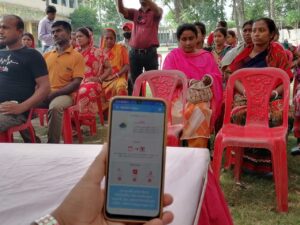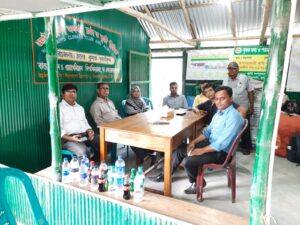Operational Weather4Farmers app in Bangladesh
Our Weather4Farmers app is now operational for farmers in Bangladesh. With this app we provide farmers access to a range of weather services, including agrometeorological advisories. An additional benefit is the translation of the Weather4Farmers app to Bengali, the official and national language of Bangladesh.
For the users who are located in Bangladesh, the app’s setting allows to pick a language: English or Bengali. Farmers in Bangladesh now have access to location specific 6-hourly and daily weather forecasts (temperature, precipitation, windspeed, cloud coverage) via the app in their local language. The app also include alerts concerning the start of the rain season, extreme weather, and advice on the suitability of the weather for spraying pesticide, fertilizing and weeding. Farmers joined an introduction of the app by Uthpal Kumar, our partner from Delta Research Initiative (DRI).
So far we reached more than 600 farmers and 60 agricultural extension officers in 5 districts (Khulna, Patukhali, Natore, Mymensingh and Sylhet) through 15 ‘Farmers’ Weather Club/Schools’. After activation of the app recently we conducted sharing sessions on the app usage with farmers and local extension officers (SAAO) in all 5 districts, locally supported by the WATERAPPS support partners. WATERAPPS is an initiative coordinated by our advisory partner, the Water System and Global Change (WSG) group from Wageningen University. Spyros Paparrizos is the contact person from WSG, regarding this initiative.
Weather Impact is, in collaboration with New Amsterdam Consult and DRI, leading the project “Agrometeorological forecasts and advisories for climate-proof food production in Bangladesh”, funded by the Water for Food Program from the Netherlands Water Partnership.
The projects aims to increase farmers’ capacity to make data-driven decisions regarding water-management, irrigation, planting calendar and extreme weather mitigation. This initiative focuses on the lower Ganges Delta in Bangladesh, a vulnerable place due to increased climate variability. By bridging the gap between farmers and weather information, we want to increase water use efficiency and increase food production.



